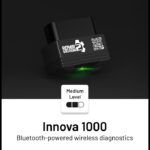Understanding your vehicle’s Controller Area Network (CAN) bus system is crucial for diagnostics, repair, and performance tuning. For automotive enthusiasts and professionals alike, accessing live data from the On-Board Diagnostics II (OBD2) and Body Control Module (BCM) is invaluable. Fortunately, a range of free and open-source software tools are available for Linux users to tap into this data stream. This article explores the landscape of free Linux OBD2 and BCM software, focusing on tools that provide live data capabilities.
Diving into Free Linux CAN Bus Tools
Linux, with its open-source nature and robust command-line interface, provides an excellent platform for interacting with vehicle CAN bus systems. Several powerful tools have emerged within the Linux ecosystem, offering functionalities ranging from basic CAN bus monitoring to advanced diagnostic procedures. These tools are particularly useful for those seeking to understand their vehicle’s OBD2 and BCM systems without the need for expensive proprietary software.
Essential Linux CAN Utilities
For fundamental CAN bus interaction on Linux, the can-utils package stands out. This suite of command-line utilities provides the building blocks for CAN bus communication. Key tools within can-utils include:
candump: This tool is essential for capturing and displaying raw CAN bus frames in real-time. It allows you to observe the data flowing across your vehicle’s network, providing insights into various system activities.cansend: Complementary tocandump,cansendenables you to transmit CAN frames onto the bus. This is useful for testing and interacting with vehicle modules, although caution is advised when sending commands to critical systems.canbusload: Monitoring bus load is vital for diagnosing network performance issues.canbusloadprovides real-time statistics on CAN bus utilization, helping identify potential bottlenecks or communication overload.
These utilities, while command-line based, offer a robust foundation for working with CAN bus data and are often prerequisites for more specialized OBD2 and BCM software.
Python CAN Libraries: Expanding Functionality
For developers and users seeking more programmatic control and flexibility, Python CAN libraries are invaluable. Python’s ease of use and extensive library ecosystem make it an ideal language for developing custom CAN bus applications. Two prominent Python libraries for CAN bus interaction on Linux are:
python-can: This highly recommended package provides a comprehensive interface for CAN bus communication in Python. It supports various CAN interfaces, including SocketCAN on Linux, and offers features for sending, receiving, and filtering CAN messages. Its versatility makes it a cornerstone for many higher-level automotive diagnostic tools.can4python: Another useful Python package,can4pythonfocuses on simplifying CAN bus signal handling, particularly within the Linux SocketCAN environment. It also provides tools for working with KCD (Kayak CAN Definition) files, which can be helpful for interpreting CAN bus data based on predefined message structures.
These Python libraries empower users to build scripts and applications for tasks such as logging live OBD2 data, interacting with BCM modules, and even developing custom diagnostic routines.
Free Software for OBD2 Live Data on Linux
Building upon the foundational CAN bus tools and libraries, several free software options are available specifically for OBD2 diagnostics on Linux. While dedicated “OBD2 software” with graphical interfaces might be less common in the free Linux space compared to Windows, the available tools offer powerful capabilities when combined effectively.
By utilizing can-utils or Python CAN libraries, along with OBD2 PIDs (Parameter IDs) – standardized codes for requesting specific diagnostic data – users can effectively retrieve live OBD2 data on Linux. Scripts can be written using python-can to request PIDs such as engine RPM, coolant temperature, vehicle speed, and more. The received CAN data can then be parsed and displayed, providing real-time insights into engine and vehicle performance.
Accessing BCM Live Data with Free Linux Tools
Similarly, accessing live data from the BCM often involves leveraging the same core Linux CAN tools. BCMs communicate over the CAN bus, and while the specific message formats and IDs are manufacturer-specific and not standardized like OBD2, the underlying communication mechanism is the same.
Tools like candump can be used to passively monitor CAN bus traffic and identify messages originating from the BCM. Combined with vehicle-specific documentation or reverse engineering efforts, users can decipher BCM messages and extract live data related to body control functions, such as lighting, door locks, window operation, and more. Python scripts built with python-can can further automate this process, allowing for targeted data acquisition and analysis of BCM signals.
Conclusion: Empowering Automotive Diagnostics with Free Linux Software
For those seeking free and powerful solutions for OBD2 and BCM diagnostics, Linux offers a compelling ecosystem. By utilizing fundamental tools like can-utils and leveraging Python CAN libraries, users can effectively access live data, monitor vehicle systems, and even develop custom diagnostic applications. While the learning curve may be steeper compared to user-friendly GUI-based software, the flexibility, control, and open-source nature of Linux tools provide immense value for automotive enthusiasts, researchers, and professionals willing to explore the command line and delve into the intricacies of CAN bus communication.
